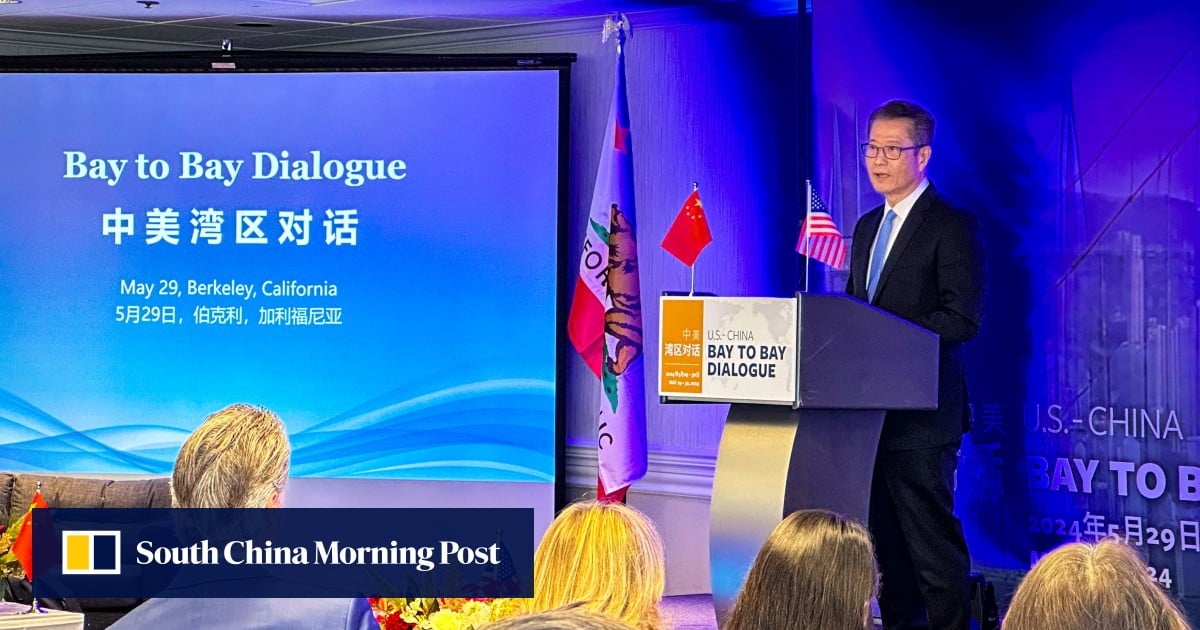The plan aims to turn Hong Kong, Macau and nine Guangdong cities into a hi-tech economic powerhouse by 2035.
The US side was represented by California governor Gavin Newsom – the first American governor to visit mainland China and Hong Kong after the Covid-19 pandemic – and environment officials.
“Given the many pressing issues we face today, from climate change to geopolitical crises, it is more crucial than ever that we maintain open and candid communications,” Chan told the audience at the “Bay to Bay Dialogue” forum following a brief welcome note by Newsom.
“Starting with our two bay areas, there is much we can work together on … Hong Kong will be pleased to play an important role in this regard.”
Chan said the deals reached by both sides “laid a solid foundation for cooperation”, and Hong Kong could contribute as a green tech and finance hub, while continuing to serve as a base for mainland companies to expand their businesses overseas.
He announced that the California-China Climate Institute, organiser of the dialogue, had signed two memorandums of understanding with Hong Kong. One with the Financial Services and Treasury Bureau was to strengthen cooperation in sustainable finance, green fintech, carbon market development, climate risk analysis and sustainability disclosures.
Another was with the University of Hong Kong’s Institute for Climate and Carbon Neutrality to forge closer links with think tanks and higher education institutions.
Guangdong governor Wang Weizhong named a few areas he believed his province and California could work on to enhance cooperation, including education, technology, culture and tourism.
“California has great practices and experiences in tackling climate change and promoting decarbonisation. We hope we could strengthen exchanges on the application of pioneer technologies and formulate collaborative projects,” he said.
His provincial government’s department of Ecology and Environment made an agreement with the California-China Climate Institute, while Guangdong’s Department of Commerce also signed a memorandum of understanding with the US Department of Commerce’s San Francisco Office.
Other deals announced on Wednesday involved a youth exchange programme and cooperation between the Chinese People’s Association for Friendship with Foreign Countries and the Pacific Civic Exchange.
The California-China Climate Institute was born from the 2017 meeting between former California governor Jerry Brown and President Xi Jinping, and launched in 2019. It also serves as the secretariat for several China-California climate memorandums of understanding.
The total economic output of the Greater Bay Area stood at 14 trillion yuan last year. Guangdong had the largest gross domestic product among all provinces, accounting for 10.7 per cent of the national total.
The nine-county San Francisco Bay Area is home to many of the world’s biggest tech companies, including Apple, Google and Facebook in Silicon Valley.
Dee Dee Myers, a senior adviser to California’s governor, told Chinese leaders at the event that the American delegation led by Newsom was warmly received in the country last October. She said both superpowers, which together made up 42 per cent of global emissions, agreed that advancing people-to-people ties in the area of climate were key goals ahead.
“It’s in nobody’s interest for our two economies to decouple, we need to continue to work together on both an economic and a diplomatic level to achieve our shared objectives,” she said.
Newsom met Chinese President Xi Jinping during his visit to the country to talk about clean energy and climate action. He also made a brief stop in Hong Kong, which sparked criticism from some US lawmakers who said a singular focus on climate issues “sets a problematic tone for future diplomatic engagement” that benefited the city’s sanctioned leaders.
Wednesday’s dialogue was held concurrently with the US-China High-level Event on Subnational Climate Action.
Last November, Washington and Beijing agreed to new commitments on helping subnational governments, enterprises and think tanks conduct discussions on policy and cooperative programmes on climate change issues.
The two-day event was part of follow-up initiatives to discuss areas including energy transition, greenhouse gases, the circular economy and resource efficiency, deforestation, and low-carbon and sustainable cities.







